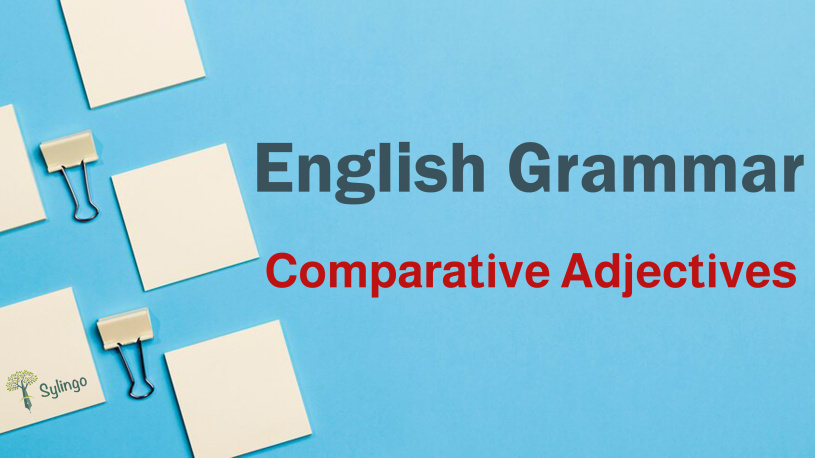Comparing means showing the differences between two or more things. We use comparative adjectives to distinguish between nouns, whether they are a person, place, or thing.
Comparative adjectives form
1- When an adjective consists of one syllable, we add the letters (er) to the end of the adjective, then we add the word (than) after it.
adjective\er + than
Note:
A syllable means a word or part of a word that is pronounced at once without stopping.
|
Adjective |
Comparative adjective |
|
Small |
Smaller than |
|
Tall |
Taller than |
|
Old |
Older than |
|
New |
Newer than |
|
Short |
Shorter than |
|
Strong |
Stronger than |
Examples:
|
Samer is stronger than his friend. |
|
I am older than you. |
|
The yellow bag is newer than the pink one. |
|
My father is taller than my brother. |
2- When an adjective consists of two or more syllables, we add the word (more or less) before the adjective, then we add the word (than) after it.
more + adjective + than
less + adjective + than
|
Adjective |
Comparative adjective |
|
Beautiful |
more/less beautiful than |
|
Expensive |
more/less expensive than |
|
Dangerous |
more/less dangerous than |
|
Delicious |
more/less delicious than |
|
Difficult |
more/less difficult than |
|
Comfortable |
more/less comfortable than |
|
Tired |
more/less tired than |
Examples:
|
I am more tired than you. |
|
My sister is more beautiful than me. |
|
English is less difficult than math. |
|
Tea is more delicious than coffee. |
|
Silver is less expensive than gold. |
Uses of the comparative adjectives
1- To show changes.
Example: I am taller now.
2- To compare two different things.
Example: My house is smaller than yours.
3- Describe the changes to something.
Example: Everything is getting more and more expensive.
4- They can be used for advice.
Example: The harder you study, the more successful you get.
Note:
We can use 'as + an adjective + as' to show that the comparison of two things is equal.
Examples:
|
I am as old as you. |
|
She is as famous as her friend. |
particular instances
1- When an adjective ends with the letter (e), we add the letter (r) after it.
Examples:
|
Nice |
Nicer |
|
Wide |
Wider |
|
Simple |
Simpler |
2- When an adjective ends with the letter (y), we replace it with the letter (i) and then add (er) to the end of the word.
Examples:
|
Noisy |
Noisier |
|
Funny |
Funnier |
|
Crazy |
Crazier |
|
Busy |
Busier |
|
Lazy |
Lazier |
3- If an adjective has one of these letters (a - i - o - u - e) before the last letter, we double the last letter and then add (er).
Examples:
|
Fat |
Fatter |
|
Sad |
Sadder |
|
Hot |
Hotter |
|
Thin |
thinner |
4- We do not use any of the previous rules in some cases.
Examples:
|
Good |
Better |
|
Bad |
Worse |
|
Far |
Farther (for physical distances) Further (for figurative distances) |
It is important to know whether an adjective consists of one or more syllables to write it in the comparative form correctly. If you have any questions or suggestions, you can share them in the comments section below.
Exercise
Use the comparative form of the adjectives in brackets.
1- England is … than Italy. (cold)
2- Omar is … than Anne. (tall)
3- This restaurant is … than the other one. (more/ expensive)
4- Eygpt is … than France. (sunny)
5- The chocolate cake is … than the fruit cake. (less/ delicious)
6- Math is .... than before. (simple)
7- Our car is ... than yours. (bad)
8- The test is .... than the last one. (more/ difficult)
9- Mike is .... than his friend. (skinny)
10- The school is .... than my grandmother's house. (far)
11- I am as .... as her. (nice)
Answers
1- colder
2- taller
3- more expensive
4- sunnier
5- less delicious
6- simpler
7- worse
8- more difficult
9- skinnier
10- farther
11- nice





